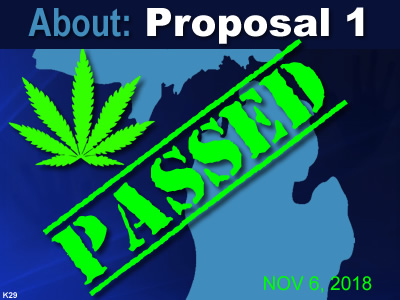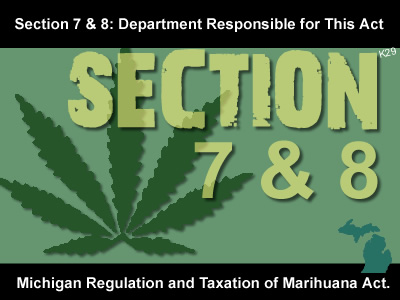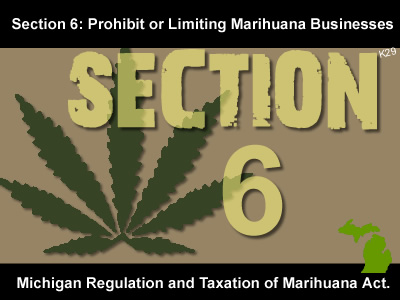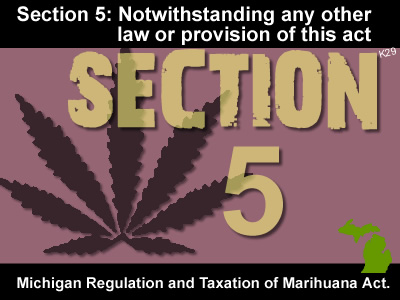
Dec 3, 2018 | Blog, Legalization
Michigan’s citizens have voted for the legalization of adult use marijuana which will become effective Dec 6, 2018. The laws that legalize marijuana do not clearly address and define many important issues pertaining to the legal adult use of marijuana.
Resolving the looming intricate details will require years or maybe a generation of interaction between lawmakers and the courts.The “lawful” use of marijuana in the State of Michigan will continue to bear legal risks, including the possibile criminal prosecution.Marijuana is still a schedule I drug.
One such subject relates to the combination of marijuana and driving. Michigan’s laws addressing intoxicated driving provide that it is unlawful to drive under the influence of or while impaired by alcohol, drugs or a combination of alcohol or drugs.
There is a zero-tolerance provision in the law for drugs appearing on the federal government’s “schedule I.” This means that if any amount of such drug is found in a driver’s blood, they are guilty of intoxicated driving, even if such drug had no impact on their ability to drive. Conviction for intoxicated driving under this zero-tolerance provision could result in punishments that are identical to those ordered for drunken drivers, including significant fines and costs, probation, the suspension of driving privileges and even possible incarceration.
In 2013 the Michigan Supreme Court carved out an exception to this zero-tolerance provision for medical marijuana users. This exception was based on an interpretation of specific language in the Michigan Medical Marihuana Act suggesting that zero tolerance should not apply to patients properly using medical marijuana. For several years prior to this ruling however, medical marijuana patients legally using marijuana faced unfair zero-tolerance prosecution and punishment for intoxicated driving.
Attack on Prop 1 – Read more of what’s crossed out here 2018-SIB-1243 to ban home growing and the tax purposes to support schools and fix roads.
Visit the MMMA Forum to learn more and open discussions
Komorn Law has represented numerous clients through the legal chaos of starting up a business in the Michigan Medical Marihuana Industry as well as consulting and legal representation for Medical Maruhuana Patients and Caregivers.
If you or someone you know has been arrested as a result of Medical Marijuana, DUI, Drugs, Forfeiture, Criminal Enterprise or any other criminal charges please contact our office and ensure you’re defended by an experienced lawyer.
Attorney Michael Komorn is recognized as an expert on the Michigan Medical Marihuana Act. He is the President of the Michigan Medical Marijuana Association (MMMA), a nonprofit patient advocacy group which advocates for the rights of medical marijuana patients and their caregivers.
Contact us for a free no-obligation case evaluation 800-656-3557.
Follow Komorn Law
This page is for informational purposes only. Laws, regulations and the world change routinely, therefore we insist you consult an attorney for the most current legal information.

Nov 30, 2018 | Blog, Legalization, News
Michigan Senator Arlan Meekoff – Repeal Prop 1 Sections and Ban Home Grow
Michigan Regulation and Taxation of Marihuana Act, by amending the title and sections 1, 2, 3, 4, 5, and 15 (MCL 333.28101, 333.28102, 333.28103, 333.28104, 333.28105, and 333.28115), and by adding sections 201, 205, 206, 207, 208, 301, 302, 303, 305, 401, 402, 403, 404, 405, 406, 407, 408, 409, 501,502, 503, 504, 505, 601, 602, 603, 604, 701, 702, and 801; and to repeal acts and parts of acts.
THE PEOPLE OF THE STATE OF MICHIGAN ENACT:

Nov 18, 2018 | Blog, Legalization
The people of the State of Michigan enact:
This act shall be known and may be cited as the Michigan Regulation and Taxation of Marihuana Act.
INITIATION OF LEGISLATION
An initiation of legislation to allow under state law the personal possession and use of marihuana by persons 21 years of age or older; to provide for the lawful cultivation and sale of marihuana and industrial hemp by persons 21 years of age or older; to permit the taxation of revenue derived from commercial marihuana facilities; to permit the promulgation of administrative rules; and to prescribe certain penalties for violations of this act.
Sec 7. The department is responsible for implementing this act and has the powers and duties necessary to control the commercial production and distribution of marihuana.
Sec. 7. 1. The department is responsible for implementing this act and has the powers and duties necessary to control the commercial production and distribution of marihuana. The department shall employ personnel and may contract with advisors and consultants as necessary to adequately perform its duties. No person who is pecuniarily interested, directly or indirectly, in any marihuana establishment may be an employee, advisor, or consultant involved in the implementation, administration, or enforcement of this act. An employee, advisor, or consultant of the department may not be personally liable for any action at law for damages sustained by a person because of an action performed or done in the performance of their duties in the implementation, administration, or enforcement of this act. The department of state police shall cooperate and assist the department in conducting background investigations of applicants. Responsibilities of the department include:
(a) promulgating rules pursuant to section 8 of this act that are necessary to implement, administer, and enforce this act;
(b) granting or denying each application for licensure and investigating each applicant to determine eligibility for licensure, including conducting a background investigation on each person holding an ownership interest in the applicant;
Have a Marijuana Related Criminal Record? Start the expungement process now…Contact Komorn Law 800-656-3557.
(c) ensuring compliance with this act and the rules promulgated thereunder by marihuana establishments by performing investigations of compliance and regular inspections of marihuana establishments and by taking appropriate disciplinary action against a licensee, including prescribing civil fines for violations of this act or rules and suspending, restricting, or revoking a state license;
(d) holding at least 4 public meetings each calendar year for the purpose of hearing complaints and receiving the views of the public with respect to administration of this act;
(e) collecting fees for licensure and fines for violations of this act or rules promulgated thereunder, depositing all fees collected in the marihuana regulation fund established by section 14 of this act, and remitting all fines collected to be deposited in the general fund; and
(f) submitting an annual report to the governor covering the previous year, which report shall include the number of state licenses of each class issued, demographic information on licensees, a description of enforcement and disciplinary actions taken against licensees, and a statement of revenues and expenses of the department related to the implementation, administration, and enforcement of this act.
Sec. 8. 1. The department shall promulgate rules to implement and administer this act pursuant to the administrative procedures act of 1969, 1969 PA 306, MCL 24.201 to MCL 24.328, including:
Sec. 8. 1. The department shall promulgate rules to implement and administer this act pursuant to the administrative procedures act of 1969, 1969 PA 306, MCL 24.201 to MCL 24.328, including:
(a) procedures for issuing a state license pursuant to section 9 of this act and for renewing, suspending, and revoking a state license;
(b) a schedule of fees in amounts not more than necessary to pay for implementation, administration, and enforcement costs of this act and that relate to the size of each licensee or the volume of business conducted by the licensee;
(c) qualifications for licensure that are directly and demonstrably related to the operation of a marihuana establishment, provided that a prior conviction solely for a marihuana-related offense does not disqualify an individual or otherwise affect eligibility for licensure, unless the offense involved distribution of a controlled substance to a minor;
(d) requirements and standards for safe cultivation, processing, and distribution of marihuana by marihuana establishments, including health standards to ensure the safe preparation of marihuana-infused products and prohibitions on pesticides that are not safe for use on marihuana;
(e) testing, packaging, and labeling standards, procedures, and requirements for marihuana, including a maximum tetrahydrocannabinol level for marihuana-infused products, a requirement that a representative sample of marihuana be tested by a marihuana safety compliance facility, and a requirement that the amount of marihuana or marihuana concentrate contained within a marihuana-infused product be specified on the product label;
(f) security requirements, including lighting, physical security, and alarm requirements, and requirements for securely transporting marihuana between marihuana establishments, provided that such requirements do not prohibit cultivation of marihuana outdoors or in greenhouses;
(g) record keeping requirements for marihuana establishments and monitoring requirements to track the transfer of marihuana by licensees;
(h) requirements for the operation of marihuana secure transporters to ensure that all marihuana establishments are properly serviced;
(i) reasonable restrictions on advertising, marketing, and display of marihuana and marihuana establishments;
(j) a plan to promote and encourage participation in the marihuana industry by people from communities that have been disproportionately impacted by marihuana prohibition and enforcement and to positively impact those communities; and
(k) penalties for failure to comply with any rule promulgated pursuant to this section or for any violation of this act by a licensee, including civil fines and suspension, revocation, or restriction of a state license.
2. In furtherance of the intent of this act, the department may promulgate rules to:
(a) provide for the issuance of additional types or classes of state licenses to operate marihuana-related businesses, including licenses that authorize only limited cultivation, processing, transportation, delivery, storage, sale, or purchase of marihuana, licenses that authorize the consumption of marihuana within designated areas, licenses that authorize the consumption of marihuana at special events in limited areas and for a limited time, licenses that authorize cultivation for purposes of propagation, and licenses intended to facilitate scientific research or education; or
(b) regulate the cultivation, processing, distribution, and sale of industrial hemp.
3. The department may not promulgate a rule that:
(a) establishes a limit on the number of any type of state licenses that may be granted;
(b) requires a customer to provide a marihuana retailer with identifying information other than identification to determine the customer’s age or requires the marihuana retailer to acquire or record personal information about customers other than information typically required in a retail transaction;
(c) prohibits a marihuana establishment from operating at a shared location of a marihuana facility operating pursuant to the medical marihuana facilities licensing act, 2016 PA 281, MCL 333.27101 to 333.27801, or prohibits a marihuana grower, marihuana processor, or marihuana retailer from operating within a single facility; or
(d) is unreasonably impracticable.
Komorn Law has represented numerous clients through the legal chaos of starting up a business in the Michigan Medical Marihuana Industry as well as consulting and legal representation for Medical Maruhuana Patients and Caregivers.
If you or someone you know has been arrested as a result of Medical Marijuana, DUI, Drugs, Forfeiture, Criminal Enterprise or any other criminal charges please contact our office and ensure you’re defended by an experienced lawyer.
Attorney Michael Komorn is recognized as an expert on the Michigan Medical Marihuana Act. He is the President of the Michigan Medical Marijuana Association (MMMA), a nonprofit patient advocacy group which advocates for the rights of medical marijuana patients and their caregivers.
Contact us for a free no-obligation case evaluation 800-656-3557.
Follow Komorn Law
This page is for informational purposes only. Laws, regulations and the world change routinely, therefore we insist you consult an attorney for the most current legal information.

Nov 18, 2018 | Blog, Legalization
Sec 6 Municipalities may completely prohibit or limit the number of marihuana establishments
The people of the State of Michigan enact:
This act shall be known and may be cited as the Michigan Regulation and Taxation of Marihuana Act.
INITIATION OF LEGISLATION
An initiation of legislation to allow under state law the personal possession and use of marihuana by persons 21 years of age or older; to provide for the lawful cultivation and sale of marihuana and industrial hemp by persons 21 years of age or older; to permit the taxation of revenue derived from commercial marihuana facilities; to permit the promulgation of administrative rules; and to prescribe certain penalties for violations of this act.
Sec. 6 Municipalities may completely prohibit or limit the number of marihuana establishments
Sec. 6. 1. Except as provided in section 4, a municipality may completely prohibit or limit the number of marihuana establishments within its boundaries. Individuals may petition to initiate an ordinance to provide for the number of marihuana establishments allowed within a municipality or to completely prohibit marihuana establishments within a municipality, and such ordinance shall be submitted to the electors of the municipality at the next regular election when a petition is signed by qualified electors in the municipality in a number greater than 5% of the votes cast for governor by qualified electors in the municipality at the last gubernatorial election. A petition under this subsection is subject to section 488 of the Michigan election law, 1954 PA 116, MCL 168.488.
2. A municipality may adopt other ordinances that are not unreasonably impracticable and do not conflict with this act or with any rule promulgated pursuant to this act and that:
(a) establish reasonable restrictions on public signs related to marihuana establishments;
(b) regulate the time, place, and manner of operation of marihuana establishments and of the production, manufacture, sale, or display of marihuana accessories;
(c) authorize the sale of marihuana for consumption in designated areas that are not accessible to persons under 21 years of age, or at special events in limited areas and for a limited time; and
(d) designate a violation of the ordinance and provide for a penalty for that violation by a marihuana establishment, provided that such violation is a civil infraction and such penalty is a civil fine of not more than $500.
Have a Marijuana Related Criminal Record? Start the expungement process now…Contact Komorn Law 800-656-3557.
3. A municipality may adopt an ordinance requiring a marihuana establishment with a physical location within the municipality to obtain a municipal license, but may not impose qualifications for licensure that conflict with this act or rules promulgated by the department.
4. A municipality may charge an annual fee of not more than $5,000 to defray application, administrative, and enforcement costs associated with the operation of the marihuana establishment in the municipality.
5. A municipality may not adopt an ordinance that restricts the transportation of marihuana through the municipality or prohibits a marihuana grower, a marihuana processor, and a marihuana retailer from operating within a single facility or from operating at a location shared with a marihuana facility operating pursuant to the medical marihuana facilities licensing act, 2016 PA 281, MCL 333.27101 to 333.27801.
Komorn Law has represented numerous clients through the legal chaos of starting up a business in the Michigan Medical Marihuana Industry as well as consulting and legal representation for Medical Maruhuana Patients and Caregivers.
If you or someone you know has been arrested as a result of Medical Marijuana, DUI, Drugs, Forfeiture, Criminal Enterprise or any other criminal charges please contact our office and ensure you’re defended by an experienced lawyer.
Attorney Michael Komorn is recognized as an expert on the Michigan Medical Marihuana Act. He is the President of the Michigan Medical Marijuana Association (MMMA), a nonprofit patient advocacy group which advocates for the rights of medical marijuana patients and their caregivers.
Contact us for a free no-obligation case evaluation 800-656-3557.
Follow Komorn Law
This page is for informational purposes only. Laws, regulations and the world change routinely, therefore we insist you consult an attorney for the most current legal information.

Nov 18, 2018 | Blog, Legalization
The people of the State of Michigan enact:
This act shall be known and may be cited as the Michigan Regulation and Taxation of Marihuana Act.
INITIATION OF LEGISLATION
An initiation of legislation to allow under state law the personal possession and use of marihuana by persons 21 years of age or older; to provide for the lawful cultivation and sale of marihuana and industrial hemp by persons 21 years of age or older; to permit the taxation of revenue derived from commercial marihuana facilities; to permit the promulgation of administrative rules; and to prescribe certain penalties for violations of this act.
Sec 5. All other laws inconsistent with this act do not apply to conduct that is permitted by this act.
Sec. 5. 1. Notwithstanding any other law or provision of this act, and except as otherwise provided in section 4 of this act, the following acts by a person 21 years of age or older are not unlawful, are not an offense, are not grounds for seizing or forfeiting property, are not grounds for arrest, prosecution, or penalty in any manner, are not grounds for search or inspection, and are not grounds to deny any other right or privilege:
(a) except as permitted by subdivision (b), possessing, using or consuming, internally possessing, purchasing, transporting, or processing 2.5 ounces or less of marihuana, except that not more than 15 grams of marihuana may be in the form of marihuana concentrate;
(b) within the person’s residence, possessing, storing, and processing not more than 10 ounces of marihuana and any marihuana produced by marihuana plants cultivated on the premises and cultivating not more than 12 marihuana plants for personal use, provided that no more than 12 marihuana plants are possessed, cultivated, or processed on the premises at once;
(c) assisting another person who is 21 years of age or older in any of the acts described in this section; and
Have a Marijuana Related Criminal Record? Start the expungement process now…Contact Komorn Law 800-656-3557.
(d) giving away or otherwise transferring without remuneration up to 2.5 ounces of marihuana, except that not more than 15 grams of marihuana may be in the form of marihuana concentrate, to a person 21 years of age or older, as long as the transfer is not advertised or promoted to the public.
2. Notwithstanding any other law or provision of this act, except as otherwise provided in section 4 of this act, the use, manufacture, possession, and purchase of marihuana accessories by a person 21 years of age or older and the distribution or sale of marihuana accessories to a person 21 years of age or older is authorized, is not unlawful, is not an offense, is not grounds for seizing or forfeiting property, is not grounds for arrest, prosecution, or penalty in any manner, and is not grounds to deny any other right or privilege.
3. A person shall not be denied custody of or visitation with a minor for conduct that is permitted by this act, unless the person’s behavior is such that it creates an unreasonable danger to the minor that can be clearly articulated and substantiated.
Komorn Law has represented numerous clients through the legal chaos of starting up a business in the Michigan Medical Marihuana Industry as well as consulting and legal representation for Medical Maruhuana Patients and Caregivers.
If you or someone you know has been arrested as a result of Medical Marijuana, DUI, Drugs, Forfeiture, Criminal Enterprise or any other criminal charges please contact our office and ensure you’re defended by an experienced lawyer.
Attorney Michael Komorn is recognized as an expert on the Michigan Medical Marihuana Act. He is the President of the Michigan Medical Marijuana Association (MMMA), a nonprofit patient advocacy group which advocates for the rights of medical marijuana patients and their caregivers.
Contact us for a free no-obligation case evaluation 800-656-3557.
Follow Komorn Law
This page is for informational purposes only. Laws, regulations and the world change routinely, therefore we insist you consult an attorney for the most current legal information.







